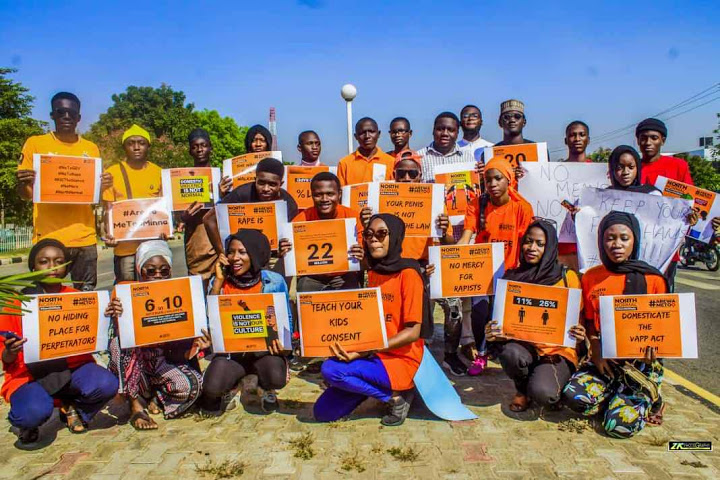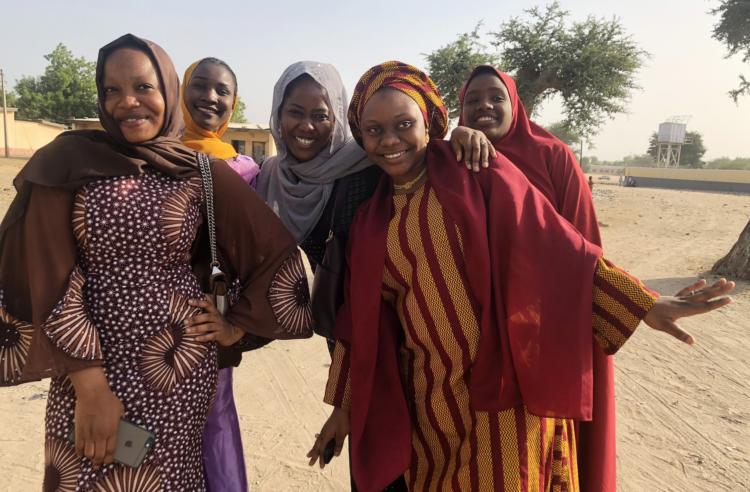By Hauwa Shaffii Nuhu
When pharmacist Khadijah Adamu logged into Twitter in February, 2019 to narrate the horrific physical abuse she survived at the hands of her ex-boyfriend, she could not have guessed that she was kick-starting a northern Nigerian-focused MeToo movement.
Nearly two years later, #ArewaMeToo has evolved into a multi-pronged movement that continues to fight sexual violence throughout northern Nigeria via social media, peaceful protests, and outreach programs to schools as well as parents in rural communities.
Adamu’s testimony was incredibly brave. As a woman from northern Nigeria, she was automatically under special scrutiny from deeply patriarchal and religious social norms that did not recognize her autonomy over her own body. By tweeting out her story, she was also admitting to visiting a boyfriend that society told her she shouldn’t have in the first place.
“I wasn’t affected by the backlash, I knew it was going to happen so I told myself ‘these people coming for you don’t matter, so don’t let their words get to you,’” Adamu explained to Sahelien.com.
When hundreds of people from the region started to come forward with stories of sexual violence they had suffered at various stages of their lives, it came as a shock. Fakhrriyyah Hashim, writer and development worker, then coined the hashtag, #ArewaMeToo (Arewa is the Hausa word for north, and is used to refer to northern Nigeria). This hashtag was critical to localizing the global movement, narrowing into the society to magnify its impact, and empowering the survivors. It also created a web of solidarity, just as Tarana Burke intended when she first used the phrase ‘MeToo’ in the context of sexual violence in 2006.
“The hashtag acted as a meeting point for people that had similar experiences to converge and have a shared space. It helped personify those converged experiences and projected it under a struggle,” said Fakhrriyyah Hashim.
The movement has since gone beyond social media and into the streets, with several protests across eight northern states. Most of those protests were aimed at getting states to domesticate the Violence Against Persons Prohibition (VAPP) Act, an act that criminalizes all forms of violence against people and widens the definitions of sexual violence, while prescribing punishments that are proportional to the crime.

Activism during a pandemic
The Covid-19 pandemic and its economic and health impacts, combined with the rise in cases of sexual violence during lockdown, has forced the movement to rethink its mode of activism from the pre-pandemic street protests and public actions.
The movement has circled back to social media, where it started. In the early days of the pandemic, Hassana Maina, activist and pioneer member of the movement, began hosting a weekly Instagram Live session, speaking to a different prominent figures on the relationship of sexual violence with certain fields or phenomena. She has hosted experts on climate change, mental health, and community development to explain to viewers how these fields intersect with sexual violence. Her show gathers an average of five hundred views per episode. So far, there have been forty-one episodes, five of which were done in partnership with Education As Vaccine (EVA).
With the lockdown long since eased, Hassana Maina and her team have launched outreach programs to parents in the rural areas of Borno, northeastern Nigeria, with a goal of educating them to unlearn harmful behavioral responses to cases of sexual violence. The team reaches out to the community and educates them on victim blaming and the dangers involved, why societal stigma needs to be discarded, and measures they can take to raise better sons, who not only recognize the privilege handed to them by socio-cultural norms but are aware of the adverse ways that these norms affect members of the society who are ranked lower than them and are oppressed as a consequence — women.
A male member of the team goes into these communities and establishes contact with the Bulama (community head). The Bulama then mobilizes parents for them. Because this is an area where Boko Haram has a stronghold, the community heads are mostly very young men forced to take on leadership roles in the absence of their parents.
“When Boko Haram attacks, people have to run. And when it comes to running, young people are more likely to run faster, and so older people fall behind and are killed. That’s how come this particular Bulama is so young; his father died and he had to take over,” explains Hassana Maina.
However, their youth makes it easier to relate with them and penetrate the community with trust. She also explained that because of the insurgent attacks and resulting displacement, there is a very high frequency of cases of unreported sexual violence.
Men have always used violence against women during war and conflict, and the Boko Haram conflict is no different. The UNHCR reported that Borno State accounted for 91.5% of the 1,666 reported cases of sexual violence in Northeastern Nigeria in 2019, making this new advocacy strategy highly critical.
“We’d been talking to children on the importance of speaking up, but these kids end up having to talk to their parents if anything happens to them. If the parents don’t know how to respond, then it’s an exercise in futility,” Maina said, explaining why she came up with this angle for her advocacy. Maina said she designs the workshops to use language implying allyship, so as to empower rather than alienate the parents.

Fast-changing norms
Maina and her team have conducted interactive, socially-distanced workshop sessions in Hausa with about three hundred parents from various communities.
“We’ve been able to change their perspectives in relation to shame. Some of the parents complained that the reason they do not want to speak up for their kids who have been abused is that they don’t want society to stigmatize them,” Maina said. But many of these parents now understand that societal stigma is a product of our collective mindset and can be changed, Maina explained.
Since the beginning of the movement, several states have since either domesticated the VAPP Act, made efforts to, or amended their laws on sexual violence.
Bauchi state, for example, has since yielded and domesticated the Act after a public hearing in which members of the public were educated on its provisions. The Borno State House of Assembly has also reached out to the movement with a proposed amended version of its Penal Code, with stricter punishments for sexual violence. There was a public hearing in Borno as well, while in Yobe state, activists hope to domesticate the VAPP Act soon.
Despite the successes, though, #ArewaMeToo has experienced major institutional opposition. The peaceful protests and rallies have received criticism and resistance from institutions that represent power. Police in Sokoto state, for example, physically assaulted and indiscriminately arrested protesters during a peaceful rally. This is no different from the historical response to protest movements in Nigeria, as most recently demonstrated during #EndSARS.
Although there have been numerous successful alliances with religious leaders in several states, most religious leaders have been against the movement, most notably the Sultan of Sokoto who announced a ‘ban’ on #ArewaMeToo last year in November.
But perhaps the most unexpected resistance is the one shown by regular members of the society who feel that silence, not activism, was the right route to take; the north of Nigeria has a fabric of shame and silence and most of us are raised on this. However, even these norms are changing fast.
“I feel that more women are having the courage to talk about these things and seek help, and that makes me really glad. It’s amazing how much can change when we spread awareness,” Khadijah Adamu said about the impacts of the movement since her speaking up. “And I can see that more men are vocally supportive, not minding the judgement they might receive from fellow men, and that’s a good thing.”
“When I look at #ArewaMeToo and how we started with just tweeting, and then having these conversations online, and subsequently witnessing these conversations become mainstream, I feel like the revolution has truly begun. We’ve made so much institutional and mental change,” Maina said.
The #ArewaMeToo movement continues to survive and change minds and laws across communities because of the dedication of the members, and their ability to come up with enduring strategies.
One area where Maina sees room for improvement is the notion of shame. “I want our society to get to a point where the stigma shifts from the victim to the perpetrator. I want to see our people recognize rape as the disgusting and heinous crime that it is, so that we become ashamed that rapists exist among us and therefore begin to hold them accountable and punish them.”


